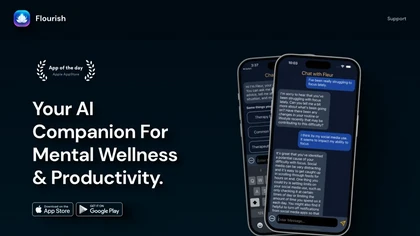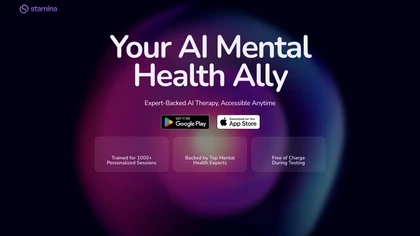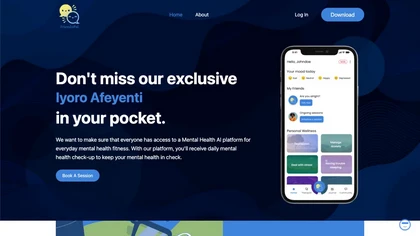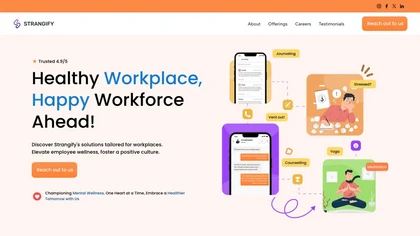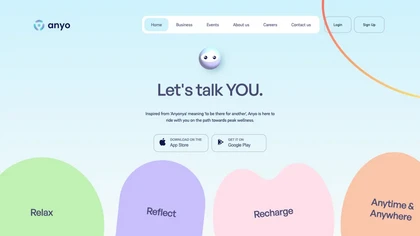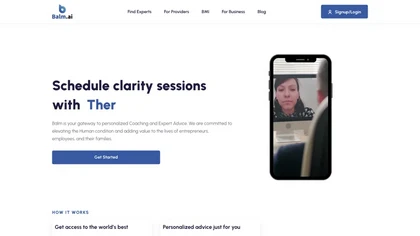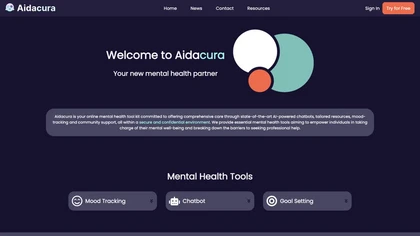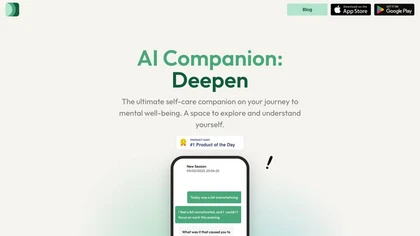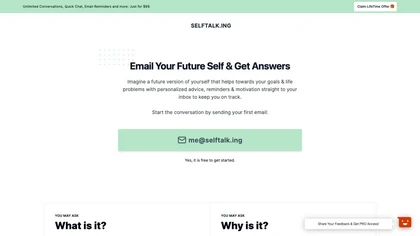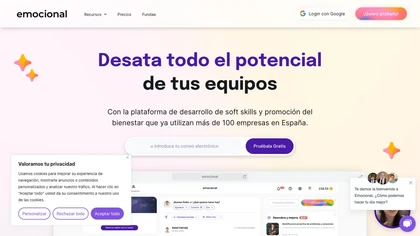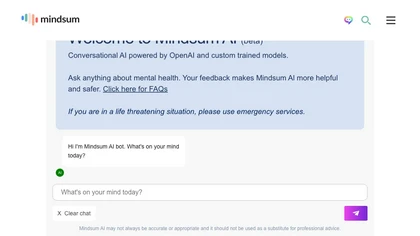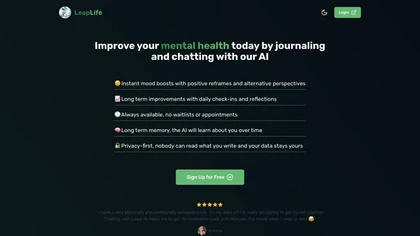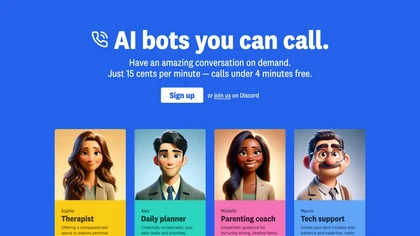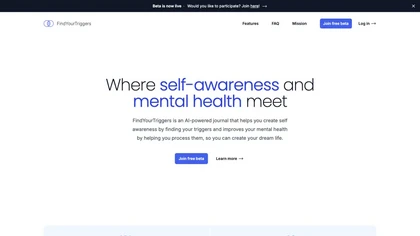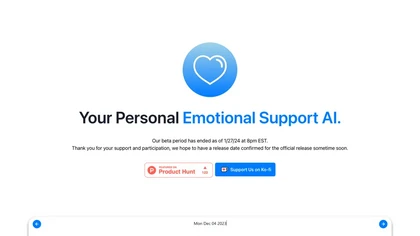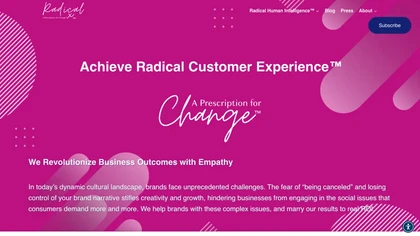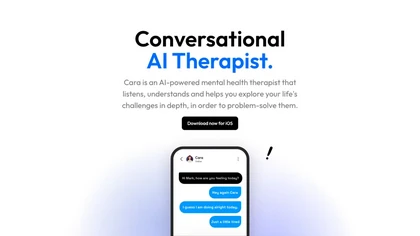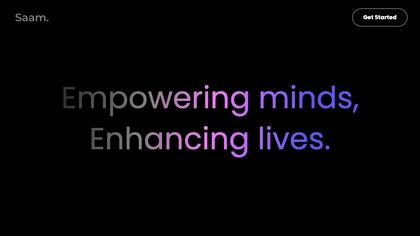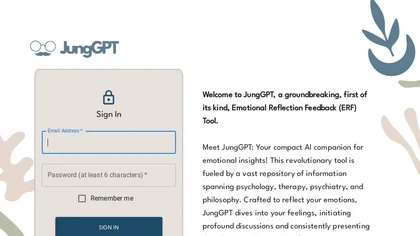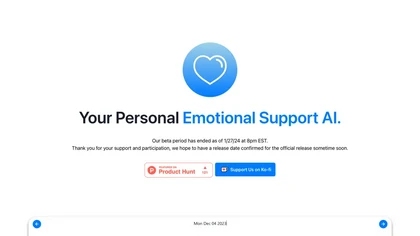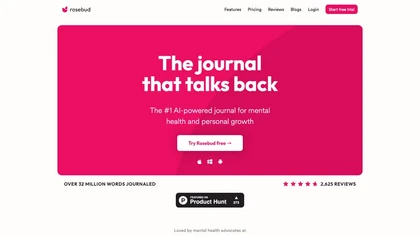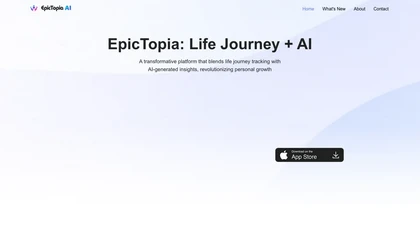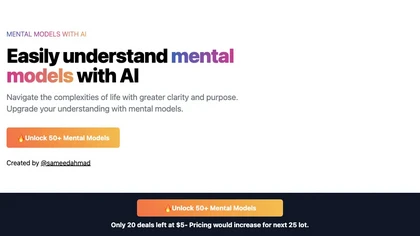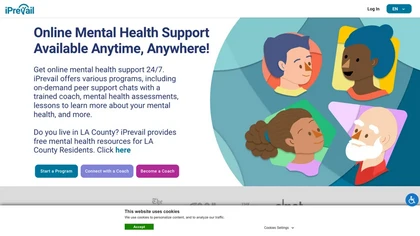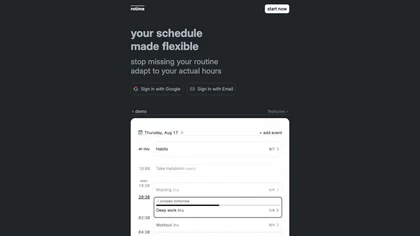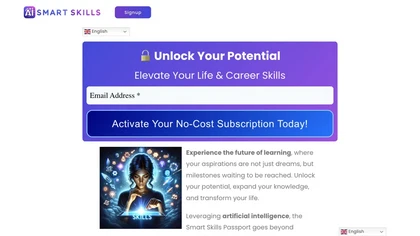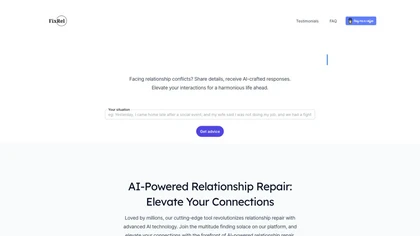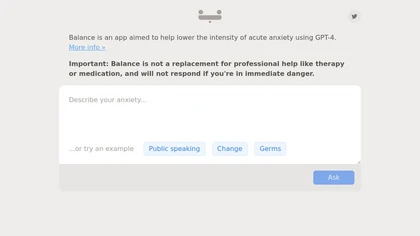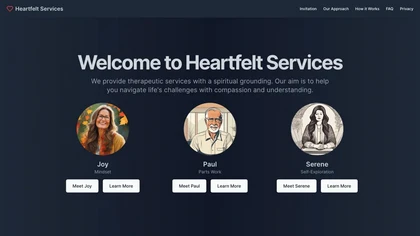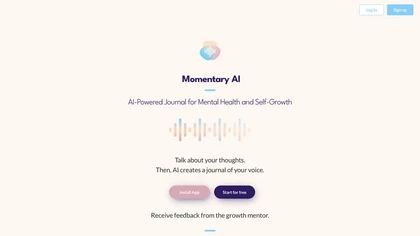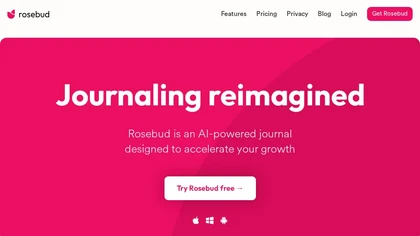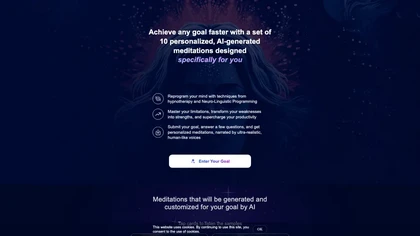AI use cases for Resilience
Generative AI can be applied in various applications for resilience. Here are some examples to explore below for inspiration with AI tools to get you started with using AI in resilience.
🛠️ 70 AI tools for Resilience
Explore a dynamic list of some of the most popular tools to get you started with various AI use cases and applications for Resilience to streamline your workflows and productivity today.
Space of mind features
- Affordable PTSD support
- Facilitated peer support
- Anonymous therapist help
- Licensed therapist-guided sessions
- Range of support spaces
Lebenmaster features
- 3-step process for goal forecasting
- Daily progress logs
- Task management functionality
- Brainstats feature
- Support for executing tasks faster and efficiently
Flourish features
- Meaningful Conversations
- Psychology-based Mental Health Assessments
- Stress Relief Tools
- Productivity Tools
- Quality Mental Health Support
Inner Lighthouse features
- Structured approach towards self-esteem improvement
- Variety of expertly curated journeys
- Daily 10-minute cognitive exercise sessions led by professional psychologists
- Privacy and security measures
- Integration into daily routine for well-being enhancement
FeelGood
4.2FeelGood features
- AI-powered
- Emotion analysis
- Actionable advice
- Personalized techniques
- Support emotional well-being
AMARI features
- AI mental health coach
- Accessible through WhatsApp
- Personalized advice
- 24/7 support through text
- Stress management
HeartDialog features
- 24/7 availability
- Personalized conversations
- Privacy protection
- Context tracking
- Integration of journaling, meditation, and CBT
🔥
Create your account, save tools & get personal recommendations
Receive a weekly digest of our handpicked top tools.
Unsubscribe anytime
Stamina AI features
- Expert-backed AI therapy tool
- Over 1000 personalized sessions
- Cognitive behavioral therapy techniques
- 24/7 availability
- Personalized support from a team of 200+ mental health professionals
IX Coach features
- Goal setting
- Obstacle overcoming
- Action planning
- Social interaction understanding
- Communication improvement
FriendnPal features
- virtual one-on-one chats with therapists
- supports various African languages
- booking therapy sessions online
- ASMR sounds for relaxation and stress relief
- digital journal for mood tracking
Insightful features
- Provide personalized on-demand coaching
- Focus on specific needs
- Available anytime, anywhere
- Blog with latest insights on living a fulfilling life
- Accountability coaching to help young professionals reach full potential
Strangify features
- Real-time crisis intervention
- Professional counseling sessions
- Supportive community of listeners and licensed counselors
- Anonymous connection for users to express thoughts and feelings
- Access to resources for mindfulness practices like yoga and meditation
Bobby Chat features
- AI-powered wellness companion
- Chat-based interface
- Resources for self-improvement
- Empowerment focus on women in the workplace
- Tools for developing healthy coping mechanisms
Anyo features
- Personalized self-care activities
- Resilience building through Carebox
- Real-time connections with listeners
- Seamless booking of therapist appointments
- High-quality content in yoga, psychology, meditation
CalmMind features
- Wellness assessment
- Calmmind chat
- Curated wellness programs
- Therabot
- Community support
Balm.ai features
- Personalized coaching
- Access to top experts
- 1-on-1 virtual sessions
- Tailored advice
- Convenient expert connection
Clearmind features
- To-Do lists
- Mood cards
- Meditation scripts
- Chat
MoodPen features
- Real-time reflection
- Personal growth tracking
- Automated journal reflections
- Personalized feedback and suggested actionable steps
- Multi-lingual support
Moments features
- Task Prioritization
- Events and Reminders
- AI Messages Composer
Aidacura features
- AI-powered chatbots
- Tailored resources
- Mood-tracking
- Community support
- Natural language processing
Dr. FeelGood features
- Personal AI motivational coach
- Human-like understanding
- Powerful motivational capabilities
- Available 24/7
- Coaching sessions anytime needed
MindForest features
- AI-powered psychology for personal growth
- Insight Journal feature for automatic journaling
- Tailored insights and exercises based on psychological principles
- Psychometrics assessments for understanding personality facets
- Integration of psychology expertise with AI innovation
Well Me Right features
- AI matching and Health Coach capabilities
- Personalized coaching
- Dietary tracking, nutritional guidance
- Guided meditation sessions
- Adaptive health partner
Deepen features
- Chat sessions with AI companion
- Guided conversations
- Insights dashboard
- Supports exploration and understanding of emotions
- Aids in decision-making
Selftalk.ing
4.9Selftalk.ing features
- Unlimited conversations with future self
- Quick chat interface
- Email reminders
- Personalized advice and motivation
- Access to past conversations
calmify.ai features
- AI-powered mental health companion
- 24/7 online support
- Personalized and empathetic assistance
- Employing evidence-based cognitive behavioral therapy (CBT) strategies
- Uses state-of-the-art large language models (LLMs)
Emocional features
- Personality evaluation
- Soft skills evaluation
- Well-being assessment
- Personalized improvement plans
- Access to digital tools like Eva AI
AtFirst features
- Affirmations
- Relaxation sessions
- Self-help guides
- Community feature
- Guided sleep affirmations
mindbuddy app features
- Specially trained chatbot 'buddy'
- Specialization in cognitive behavioral therapy (CBT)
- Personalized guidance through AI
- Track mood and access past chat sessions
- Continuous learning and adaptation capabilities
MindwellAI features
- Self-care
- Coping tools
- Journal writing
- Coaching
- Anxiety management program
Mindsum features
- Answer mental health-related queries
- Offer custom train models
LeapLife features
- AI chat function
- Personalized chatting AI
- Daily journaling
- AI therapists chat
- End-to-end encryption
Sixty features
- Prioritization of to-do list
- Inbox management
- Appointment scheduling
- Agenda creation
- Reminder system
Call an AI features
- Conversational AI tool
- Available via phone
- Range of AI companions
- Personalized AI experience
- Future developments
therapini features
- Personalized support and guidance
- Navigation of common therapy FAQs
- Confidential mental wellness assistance
- Communication via talk or text
- Practical and encouraging tailored advice
Tendi features
- AI-powered personal financial advisor
- Assists in setting financial goals, planning, budgeting, and achieving milestones
- Analyzes spending, saving, and investing behaviors
- Provides actionable insights and personalized financial advice
- Ensures data security through advanced encryption and strict privacy protocols
FindYourTriggers features
- AI-powered journal
- Generates prompts based on user input
- Tracks user moods
- Identifies and processes behavior triggers
- Supports a structured three-step plan of assessment, planning, and implementing
Reassurance features
- Personal emotional support through AI chatbot
- Customization of responses with various fonts and text-to-speech options
- Maintaining a personal journal for logging thoughts and concerns
- Remembering past conversations for continuity
- Interaction tracking based on user inputs and responses
LeeAI features
- 3d performance assistant
- Robotic life coach
- Utilizes chatgpt-4
- Data privacy
6000 thoughts features
- Organize thoughts
- Clarify thinking
- Identify biases
- Achieve breakthroughs
- Self-reflection
Radical Human Intelligence™ features
- 3 R methodology support
- Deep stakeholder understanding
- Human level connections
- Informed decision making
- Fostering trust and collaboration
Cara features
- Conversational AI therapist
- Powered by GPT
- Natural responses and advice
- Insightful and non-judgmental guidance
- Available on iOS
Drsaam features
- Journaling
- Friend integration
- Confidentiality
- Privacy
- Security
JungGPT features
- Emotional reflection
- Emotional support
- Personal growth
- Self-reflection
- Therapeutic exploration
Reassurance AI (Beta) features
- Interactive chatbot named Sai for guidance and advice
- Personal journal for logging thoughts and self-reflection
- Customization options for fonts, sizes, and speech voices
- Tracking of interactions with Sai and journal entries
- Subscription for updates on future releases and features
Monarch money features
- Net worth syncing
- Budgeting
- Recurring investments
- Spending insights
- Collaborative solutions
Rosebud features
- Daily check-ins
- Auto-tagging key insights
- Identify meaningful goals
- Track people, topics, and moods
- Emotionally-focused capabilities
EpicTopia AI features
- Life journey tracking
- AI-generated insights
- Tailored action plans
- Personalized chronicle on a timeline
- Detailed guidance
RetireMint features
- Virtual retirement planning assistant
- Assessment of retirement readiness
- Personalized feedback and advice
- Professional assessments in various retirement-related areas
- Comprehensive retirement roadmap building tools and resources
Mind Your Now features
- AI-powered planner
- Intelligent task scheduling
- Effortless task management
- Reminders and notifications
- Streamline scheduling process
Mental Models features
- Mental model generation
- Encourages different thinking
- Biases confirmation
- Cognitive dissonance reduction
Personalities.ME features
- Personality exploration
- Career guidance
- Relationship insights
iprevail.com features
- Personalized wellness programs
- User-friendly interface
- Self-help modules
- Therapy sessions
- AI algorithms for progress tracking
rotime features
- Google and email sign-in
- Customizable events with flexible start and end times
- Focus-aware user interface
- Support for reusable templates for events and tasks
- Access to historical data and export personal data
SmartLifeSkills
4.8SmartLifeSkills features
- Interactive platform with AI chatbots
- Multilingual lessons with authentic accents
- Adjustable playback speed
- Advanced text-to-speech technology
- Custom quiz generator
Lily features
- Voice-activated AI
- Personalized guidance for mental health
- Support for anxiety, stress, self-esteem
- Digital wellness guide
- Privacy and tailored support
Fix Rel features
- AI-powered relationship assistant
- AI-crafted responses
- Accessible on various devices
- User-friendly interface
- Secure data measures
Shoorah Wellbeing features
- Privacy prioritization
- Advanced algorithms
- Secure and confidential platform
- Maintaining data privacy
- Safe and trusted space
Balance features
- Provides immediate support for individuals with anxiety
- Challenges anxious thoughts
- Assists in reducing the intensity of anxious thoughts
- Offers features to address specific anxieties such as public speaking or germ phobia
- Uses gpt-4 to provide assistance
Mint features
- Financial transaction tracking
- Account linking with over 17,000 financial institutions
- Categorization of transactions
- Insights on monthly spending habits
- Expense tracking and analysis
Heartfelt Services features
- Virtual therapists (e.g., Paul and Serene)
- Innovative approach to self-exploration and healing
- Confidentiality prioritization
- Non-judgmental space for users
- Team of dedicated therapists
Soula Care features
- Personalized AI-based chatbot
- Evidence-based and structured content
- Holistic pregnancy planner and tracker
- Mental health support
- Access to top experts in the field
Lifesage features
- Health
- Wealth
- Wisdom
- Personal development
- Self-improvement
Mimir features
- Matching
- Mentor
- Advice
- Questions
- Previous queries
Momentary features
- AI-powered journaling experience
- Voice-activated journaling
- AI-powered transcribing
- Mood categorization
- Supportive AI mentor
Motiv8 features
- Goal breakdown into detailed task lists
- Browse trending ideas and ready-to-use task lists
- Seamless task management
- Personalized guidance and recommendations
- Data security and privacy measures
Mood AI by Mindset features
- Daily check-ins
- Daily reflections
- Expert advice
- Daily quotes
Rosebud Journal features
- Analyzing thoughts
- Organizing into themes and topics
- Extracting insights
- Uncovering patterns
- Auto-tagging entries
Neomind features
- Personalized meditations generated by AI
- Utilizes hypnotherapy and neuro-linguistic programming techniques
- Customization based on user's specific goal and needs
- Narrated by ultra-realistic, human-like voices
- Accompanied by a 53-page workbook with science-backed exercises and NLP techniques


